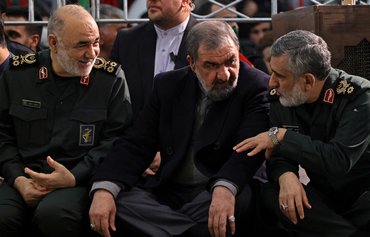The recent arrest and imprisonment of a US journalist in Russia on "espionage" charges bring to light similarities between Russian and Iranian detentions of this kind and the underlying motivations behind them, observers said.
Both nations have routinely employed this strategy as a means to intimidate dissenters or to use the prisoners as pawns to extract concessions -- such as release of blocked funds or a prisoner exchange -- from their captives' countries of residence.
Wall Street Journal (WSJ) reporter Evan Gershkovich, 31, who covered Russia for the internationally known newspaper, was arrested March 29 in Yekaterinburg on espionage charges, which he and the newspaper have vehemently denied.
Gershkovich, whose parents are Soviet-born exiles, is the first US journalist to be detained in Russia on spying charges since the end of the Cold War.
![Iranians gather in Brussels to protest Swedish-Iranian citizen Ahmad Reza Djalali's death sentence in this undated photo. Djalali, an emergency medicine specialist, was detained in Iran in April 2016. [Independent Persian]](/cnmi_am/images/2023/04/20/41718-Iran-prisoner-Djalali-600_384.jpg)
Iranians gather in Brussels to protest Swedish-Iranian citizen Ahmad Reza Djalali's death sentence in this undated photo. Djalali, an emergency medicine specialist, was detained in Iran in April 2016. [Independent Persian]
![Colleagues of French-Iranian academic Fariba Adelkhah protest her detainment in Iran in front of Science-Po in Paris on January 13, 2022. [Thomas Coex/AFP]](/cnmi_am/images/2023/04/20/41721-French-Iranian-academic-600_384.jpg)
Colleagues of French-Iranian academic Fariba Adelkhah protest her detainment in Iran in front of Science-Po in Paris on January 13, 2022. [Thomas Coex/AFP]
![Environmentalist and cheetah researcher Kavous Seyed-Emami, seen here in an undated photo, died in custody in Iran under suspicious circumstances. [Iran International]](/cnmi_am/images/2023/04/20/41723-Iran-Kavous-SeyedEmami-600_384.jpg)
Environmentalist and cheetah researcher Kavous Seyed-Emami, seen here in an undated photo, died in custody in Iran under suspicious circumstances. [Iran International]
Before Gershkovich, the last US journalist detained in Russia was US News & World Report Moscow correspondent Nicholas Daniloff, who was arrested in 1986 on espionage charges and kept in a KGB prison for 13 days.
US Women's National Basketball Association star Brittney Griner was arrested in Russia on March 4, 2022, for carrying a small amount of cannabis oil and sentenced to nine years in prison.
On December 8, Russia and the United States conducted a prisoner exchange, trading Griner for Viktor Bout, a Russian arms dealer.
Earlier in 2022, former US Marine Trevor Reed also was released in a prisoner swap with Russia.
Two other US citizens are still being detained in Russia, including another former US Marine, Paul Whelan, who was detained on espionage charges in 2018 and is in his fifth year of a 16-year prison sentence.
Marc Fogel, 61, was arrested in August 2021 when he tried to enter Russia with a small amount of medical marijuana, for which he had a prescription.
Russia has held at least one US citizen in detention each year since 2017, per a September 2022 report from the Bringing our Families Home campaign.
According to an April NPR report, Moscow has been arresting an increasing number of private US citizens.
Russian methods in Iran
In Iran, a number of foreign nationals and dual citizens have been arrested and imprisoned over the years. As in Russia, many have been accused of espionage.
The similarities between the methods of detention, interrogation, forced confessions and torture indicate Iran has copied Soviet and modern-day Russia in pursuing dissidents, analysts with knowledge of the situation said.
"If you read the ways prisoners were interrogated in Soviet Russia, as well as today's Russia, you can clearly see that what the Iranian regime does is rather similar to what the Russians do," an Iran-based politics professor said.
A key pillar of the Pahlavi dynasty, which ruled Iran until 1979, was promoting anti-Marxism education and combating the reach and spread of communism from China and the neighbouring Soviet Union, he said, speaking on condition of anonymity.
Marxist and communist activists were part of the anti-monarchy movement in the lead-up to the 1979 Islamic Revolution, when they joined forces with Islamic revolutionary sympathisers, the professor explained.
In the early days after the Islamic Revolution, these activists "were part of the propaganda machine against the shah", said a former Iranian political prisoner who was jailed for his Marxist activities in the 1980s.
They evidently had taken a leaf out of the Soviet playbook when the current Iranian regime came to power, he told Al-Mashareq.
"Common points were numerous," the professor said. "They were clearly enforcing what they had read and been taught."
Dual citizens held in Iran
Several dual citizens are currently held in Iran's notorious Evin prison.
Businessman and wildlife conservationist Morad Tahbaz, who holds Iranian, US and British citizenship, was arrested during a clampdown on environmental activists in January 2018.
His Canadian-Iranian colleague, Kavous Seyed-Emami, died in custody a few weeks later under suspicious circumstances.
Regime officials accused Tahbaz and seven other environmentalists of gathering classified information about Iran's strategic areas under the guise of environmental and research projects.
United Nations human rights experts said it was "hard to fathom how working to preserve the Iranian flora and fauna can possibly be linked to conducting espionage against Iranian interests", the BBC reported.
In October 2018, Tahbaz and three of his colleagues were charged with "corruption on earth" -- a Qur'anic reference used since the 1979 Islamic Revolution to justify the death penalty for political prisoners.
The charge was later changed to "co-operating with the hostile state of the US".
The regime has a history of charging political activists with "attempting to overthrow the regime" after slapping on a "corruption on earth" charge.
In October 2015, the Islamic Revolutionary Guard Corps (IRGC) arrested Siamak Namazi, a US-Iranian citizen who worked for Dubai-based Crescent Petroleum.
His elderly father, Baquer, was arrested in February 2016 after receiving permission to visit his son in Evin prison.
In October, both were handed a 10-year prison sentence for "co-operating with a foreign enemy state". Baquer Namazi was released in October, but his son remains imprisoned in Iran.
Swedish-Iranian citizen Ahmad Reza Djalali, an emergency medicine specialist, was detained in April 2016 while on travel from Sweden.
Amnesty International said he remained imprisoned for seven months -- three of them in solitary confinement -- before he was allowed access to a lawyer.
In October 2017, Djalali was convicted of "spreading corruption on earth" and sentenced to death. His lawyers said the court's decision was based on evidence obtained under duress.
In April 2021, he was reportedly transferred to a multi-occupancy cell. He remains imprisoned, although no date has been announced for what court officials have referred to as his imminent execution.
Other dual citizens remain imprisoned in Iran, including US-Iranian businessman Emad Shargi who was accused of espionage.
Meanwhile, Iranian-French academic Fariba Adelkhah, who was arrested in 2019 for allegedly conspiring against national security and spreading propaganda against the Iranian government, has been released in February but remains unable to travel as the Iranian authorities refuse to return her identity papers.
"The similar ways in which Iran and Russia imprison and accuse those whom they fear is emblematic of how isolated, allied dictatorships run their countries," the Iran-based politics professor said.
"In some cases, Tehran has even taken a step farther than Moscow in the ways it treats dual citizen prisoners, but the general suppressive ideas are clearly close," he said.

![US journalist Evan Gershkovich, arrested in Russia on espionage charges, stands inside a defendants' cage before a hearing to consider an appeal on his arrest at the Moscow City Court on April 18. [Natalia Kolesnikova/AFP]](/cnmi_am/images/2023/04/20/41722-Evan-Gershkovich-Russia-600_384.jpg)






